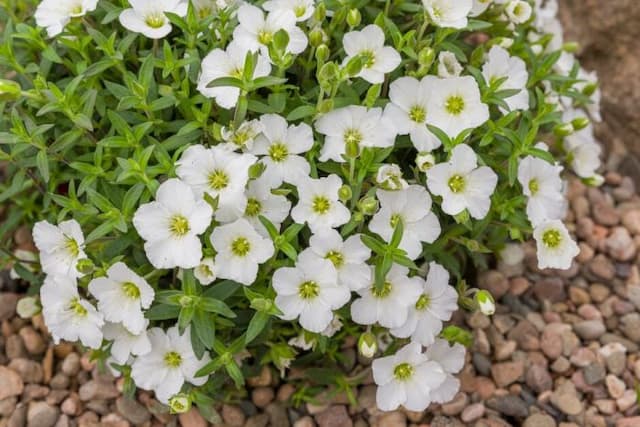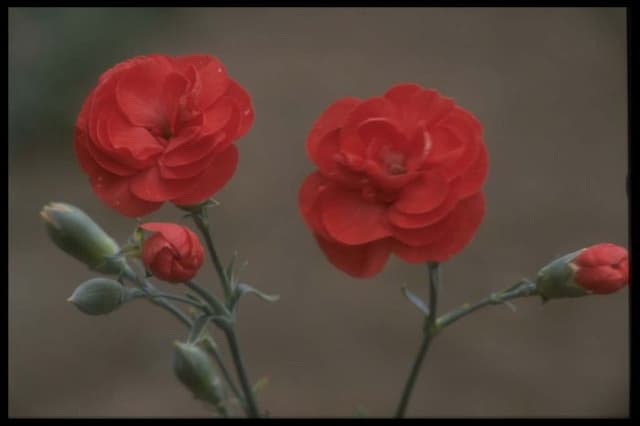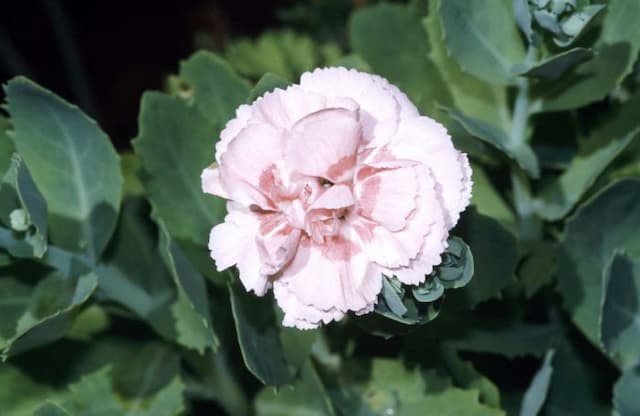Carnation Dianthus 'Monica Wyatt' (p)

ABOUT
Dianthus 'Monica Wyatt' is a captivating variety known for its enchanting flowers. The blooms are a standout feature, often exhibiting a rich color with a unique pattern. The petals of these flowers have fringed edges, which add to their lacy and delicate appearance. The coloration of the petals is typically vibrant, sometimes with a gradient or with contrasting hues, such as a different colored eye or margins, that highlight the intricate detail of each flower. The foliage of Dianthus 'Monica Wyatt' presents a lovely backdrop to its striking flowers. The leaves tend to be slender and elongated, with a blue-green or gray-green color that provides a perfect contrast to the bright blooms. The texture of the leaves is subtly grass-like, and they grow densely to form a low mound or tuft which cradles the flowering stems. This plant not only adds visual appeal with its flowers and foliage but also contributes a delightful scent to the garden. The fragrance is often described as sweet and spicy, a characteristic feature of many in its family, which is easily carried on the breeze and attracts pollinators as well as human admirers. Overall, Dianthus 'Monica Wyatt' is a showy addition to any garden or landscape, providing bursts of color and sweet fragrance from its charming flowers set against a backdrop of attractive foliage.
About this plant
 Names
NamesSynonyms
Monica Wyatt, Sweet William
Common names
Dianthus 'Monica Wyatt'.
 Toxicity
ToxicityTo humans
Generally, the carnation plant is not considered toxic to humans. There are no specific symptoms of poisoning associated with the Dianthus 'Monica Wyatt', as this plant is typically safe for humans to handle and is not known to cause any severe consequences if ingested in small quantities. However, it is still advisable to avoid ingestion since the digestive system may not respond well to non-food plants.
To pets
Carnations, including Dianthus 'Monica Wyatt', are considered to be mildly toxic to pets. If ingested, the plant may cause gastrointestinal upset in animals, which can result in symptoms like vomiting, diarrhea, and drooling. While the symptoms are typically not severe, it is important to prevent pets from ingesting this plant and to consult with a veterinarian if any signs of distress are observed after ingestion.
 Characteristics
CharacteristicsLife cycle
Perennials
Foliage type
Evergreen
Color of leaves
Blue-green
Flower color
Pink
Height
1 foot 12 inches (30-45 cm)
Spread
1 foot 12 inches (30-45 cm)
Plant type
Herb
Hardiness zones
6-9
Native area
Europe
Benefits
 General Benefits
General Benefits- Aesthetic Appeal: Adds vibrant color and visual interest to gardens with its beautiful pink to purple blooms.
- Fragrance: Offers a delightful spicy clove-like scent, enhancing the sensory experience of a garden.
- Borders and Edges: Ideal for use in borders, edging, or as groundcover due to its compact growth habit.
- Cut Flowers: Suitable for creating attractive bouquet arrangements that can brighten up indoor spaces.
- Easy to Grow: Known for being a hardy plant that is relatively easy to care for, requiring minimal maintenance.
- Long Blooming Season: Provides an extended flowering period, typically from late spring to early fall.
- Pollinator Friendly: Attracts bees, butterflies and other beneficial insects, promoting biodiversity.
- Drought Tolerance: Once established, it is quite drought-resistant, making it suitable for xeriscaping and low-water gardens.
- Deer Resistance: Less likely to be eaten by deer, which can be an advantage in areas where deer browsing is a problem.
- Variety of Uses: Can be planted in rock gardens, container gardens, and is also suitable for alpine and cottage gardens.
 Medical Properties
Medical PropertiesThis plant is not used for medical purposes.
 Air-purifying Qualities
Air-purifying QualitiesThis plant is not specifically known for air purifying qualities.
 Other Uses
Other Uses- Edible Garnish: The flowers of the Dianthus can be used to add color and mild spice to salads or desserts.
- Art and Craft Material: The brightly colored petals can be pressed and utilized in creating floral-themed art or crafts.
- Perfumery: Dianthus flowers are known for their rich fragrance and can be used in homemade potpourris or natural perfumes.
- Textile Dye: Historically, the flowers could be used to produce a light red or pink dye for coloring textiles.
- Fragrant Sachets: Dried Dianthus petals can fill sachets to freshen up drawers and wardrobes with their pleasant scent.
- Natural Confetti: Biodegradable and colorful, the petals make an eco-friendly alternative to traditional paper confetti for celebrations.
- Ice Cubes Decoration: Freeze petals in ice cubes for a beautiful and unique touch to beverages at special occasions.
- Floral Water: Petals can be steeped in water to make a fragrant floral water for cosmetic use or as a linen spray.
- Candle Embeds: The flowers can be embedded into the wax of homemade candles for decoration and subtle scent.
- Greeting Cards: Dianthus petals can be dried and glued onto greeting cards for an added personal and floral touch.
Interesting Facts
 Feng Shui
Feng ShuiThe plant Carnation is not used in Feng Shui practice.
 Zodiac Sign Compitability
Zodiac Sign CompitabilityThe Carnation is not used in astrology practice.
 Plant Symbolism
Plant Symbolism- Love and Admiration: Dianthus flowers, including 'Monica Wyatt', are often associated with feelings of love and admiration, dating back to ancient Greek times where the name dianthus originates from the words 'dios' (godly) and 'anthos' (flower), often considered the "flowers of the gods" signifying divine love.
- Passion: The vibrant hues and the spicy fragrance of the Dianthus 'Monica Wyatt' can be symbolic of passion and a strong, heartfelt commitment.
- Boldness: The unique color patterns and striking form of the Dianthus 'Monica Wyatt' can represent boldness or a daring spirit in the language of flowers.
- Devotion and Fidelity: With their long-lasting blooms, dianthus plants like 'Monica Wyatt' are sometimes used to symbolize fidelity and the commitment to stand by someone's side over time.
- Pure Affection: Dianthus carries a symbolism of pure affection, platonic love, and friendship, making it a great gift to a dear friend or family member to express these sentiments.
 Water
WaterCarnation 'Monica Wyatt' prefers even moisture with thorough waterings. Water deeply when the top inch of soil feels dry to the touch, generally about once a week. Be consistent with watering, providing about one gallon per plant for each watering session, depending on weather conditions. Avoid overhead watering to keep the foliage dry and prevent fungal diseases. During particularly hot or dry spells, increase watering frequency to maintain soil moisture without making the soil waterlogged.
 Light
LightCarnation 'Monica Wyatt' thrives in full sun conditions, requiring at least six hours of direct sunlight daily. The ideal spot for this plant would be in a garden area that is exposed to unfiltered sunlight for most of the day. Avoid planting in areas with too much shade, as this can result in poor blooming and a leggy growth habit.
 Temperature
TemperatureCarnation 'Monica Wyatt' is hardy to various temperatures but thrives best in cooler conditions, ideally between 60°F and 70°F. They can tolerate a minimum temperature down to about 40°F and a maximum temperature up to around 85°F. Ensure that the plant is protected from extreme cold and frost, as well as excessively high temperatures that could stress the plant.
 Pruning
PruningPruning Carnation 'Monica Wyatt' encourages vigorous growth and more abundant blooms. Deadhead spent flowers regularly to promote continuous blooming throughout the growing season. Perform a more thorough pruning in late winter or early spring to remove old or weak stems and to shape the plant. Pruning is best done just before new growth begins.
 Cleaning
CleaningAs needed
 Soil
SoilThe best soil mix for Dianthus, commonly known as Pinks or Carnation, should be light and well-draining with a neutral to slightly alkaline pH of around 6.5 to 7.5. A mixture consisting of loam, sand, or perlite, and compost is ideal. This combination allows for good drainage and aeration, crucial for preventing root rot and providing the necessary nutrients.
 Repotting
RepottingPinks should be repotted every 2 to 3 years to refresh the soil and accommodate root growth. The best time to repot is in the spring or early summer when the plant is actively growing.
 Humidity & Misting
Humidity & MistingPinks prefer moderate humidity conditions. They thrive in an environment that is not too humid as excessive humidity can lead to fungal diseases. Normal indoor humidity levels are typically suitable for these plants.
 Suitable locations
Suitable locationsIndoor
Use well-draining soil, place in full sun, avoid overwatering.
Outdoor
Plant in full sun to part shade, well-draining soil, regular deadheading.
Hardiness zone
3-9 USDA
 Life cycle
Life cycleThe life of Dianthus 'Monica Wyatt', also known as Pinks, begins with seed germination, occurring in early spring when the soil temperatures are between 20 to 25 degrees Celsius. Following germination, seedlings grow and establish themselves, developing a rosette of leaves at the base. As they mature, the stems elongate, and the plants may start to produce flower buds. Flowering typically occurs in late spring to early summer, displaying the plant's characteristic fragrant, fringed flowers. After pollination, which is often aided by insects, the flowers produce seeds that are dispersed for the next generation. In the fall or winter, the plant may die back, especially in cooler climates, but because Dianthus 'Monica Wyatt' is a perennial, it will often re-sprout from the base in the following spring.
 Propogation
PropogationPropogation time
Spring-Early Summer
The most popular method of propagation for Dianthus 'Monica Wyatt', commonly known as Pinks, is by cuttings. This is typically done in late spring or early summer. Taking non-flowering shoots which are just beginning to harden off ensures the best results. Cuttings should be about 3 to 4 inches (approximately 7.5 to 10 cm) long, and the lower leaves are removed to expose a clean stem. The stem is then inserted into a well-draining soil mix, ensuring that one to two sets of leaf nodes are beneath the soil surface. Keeping the soil moist but not waterlogged and providing a stable environment with indirect light will encourage rooting. After a few weeks, the cuttings will have formed roots and can be transplanted to their final location.



![Pink [Tequila Sunrise]](/_next/image?url=https%3A%2F%2Fplants-admin.emdemapps.com%2Fimages%2Fplants%2F%2Fimages%2F604b5d995d06e.png&w=640&q=75)





